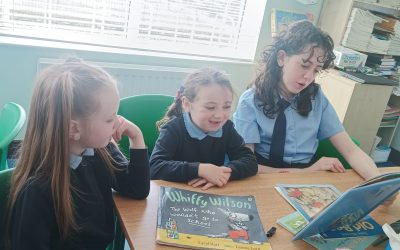We have two teachers trained in the Reading Recovery programme in our school.
This link provides information on how Reading Recovery works in an Irish context. https://new.express.adobe.com/webpage/EjOf0LHwBygJo
Parents may find the following information useful regarding the theories behind the Reading Recovery programme.
Four theoretical assumptions that underlie Reading Recovery IPD & CPD
1. Reading and writing are learned behaviours
2. Systematic observation informs teaching
3. Building on children’s strengths makes it easy for them to learn
4. Accelerative learning is critical to success

Seven key principles of Reading Recovery
1. Reading is a complex problem-solving process
2. Children construct their own understandings
3. Children come to literacy with varying knowledge
4. Reading and writing are reciprocal and interrelated processes
5. Learning to read involves a process of reading and writing continuous text
6. Learning to read involves a continuous process of changes over time
7. Children take different paths to literacy learning

Click here to find out more about Reading Recovery and the research which underpins the programme

What Works Clearinghouse rates Reading Recovery highest based on research evidence of effectiveness. Click the image below to find out more.

Click here to read about the long-term effects of Reading Recovery

The Stories We Tell Ourselves: Reading Recovery and the MSV Myth


| Core Texts for Reading Recovery |
|---|
| Clay, M. Marie. (2016). Literacy lessons designed for individuals, (2nd ed.). Auckland, NZ: GLobal Educations Systems (GES) Ltd. |
| Clay, M. M. (2015) .Change over time in children’s literacy development. Auckland: NZ: Globa Education Systems (GES) Ltd. |
| Clay, M. M. and Watson, B. (1981). An Inservice Programme for Reading Recovery Teachers. Education 4 (19), 22-27. Reprinted in Clay, Marie M. (1982).Observing young readers: Selected papers. Exeter, NH: Heinemann Educational Books. |
| Clay, M. M. (2013). An observation survey of early literacy achievement (3rd ed.). Portsmouth, NH: Heinemann. |
| Bodman, S. Smith, J, (2013) The Theoretical and Pedagogical Base of Reading Recovery. In Burroughs-Lange, S. & Ince, A. (2013) (Eds) Reading Recovery and Every Child a Reader: History, Policy and Practice.IOEPress. |
| Lyons, C.A. (2003) Teaching Struggling Readers: How to use brain research to maximise learning. Portsmouth, NH: Heinemann |
| Pinnell, G.S. (1997) ‘An Inquiry Based Model for Educating Teachers of Literacy’ . In S. Swartz & A. Klein (Eds) Research in Reading Recovery (Chapter 1, pp 6- 17). Portsmouth, NH: Heinnemann. |
| Clay, M. M. (1987). Learning to be Learning Disabled. New Zealand Journal of Educational Studies, 22, 155–173. |





